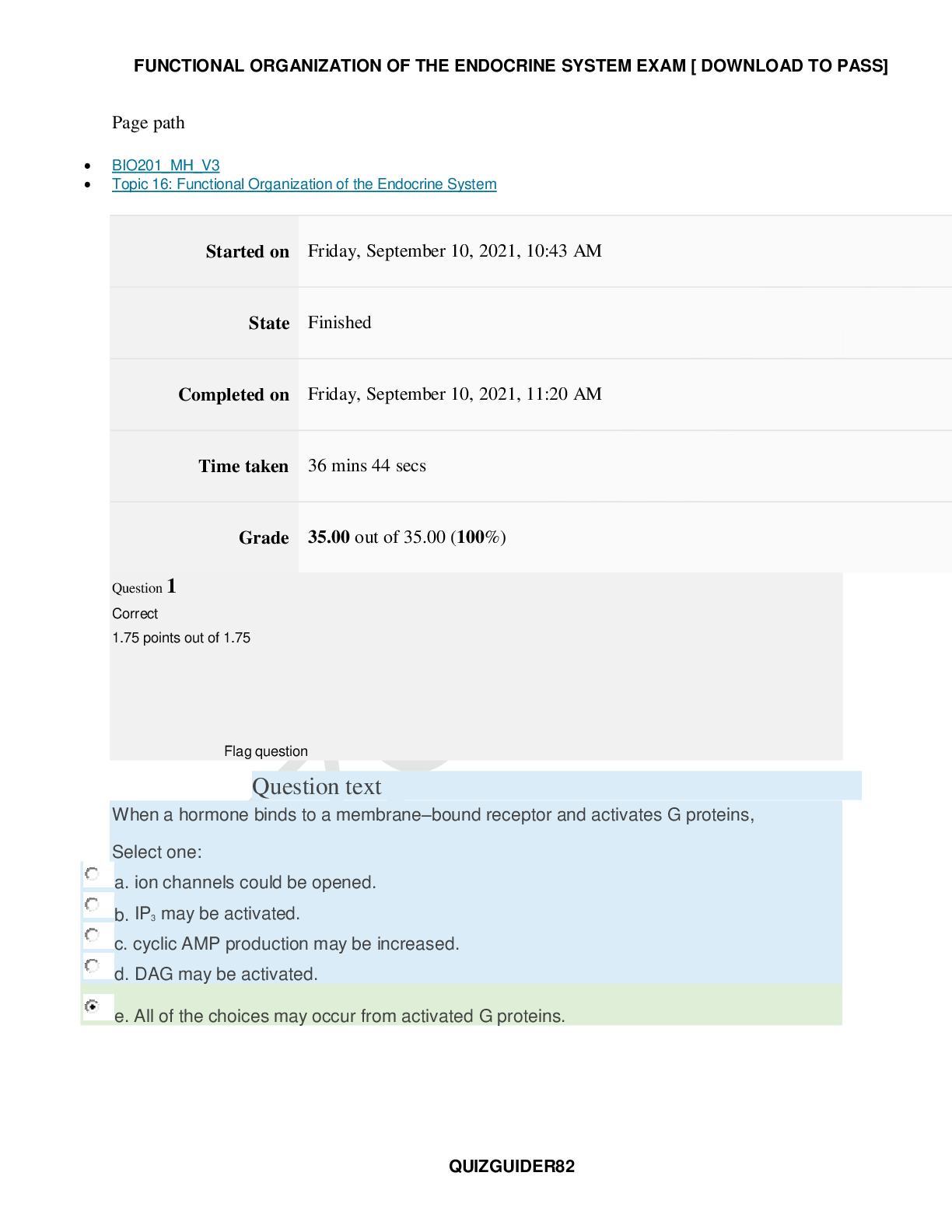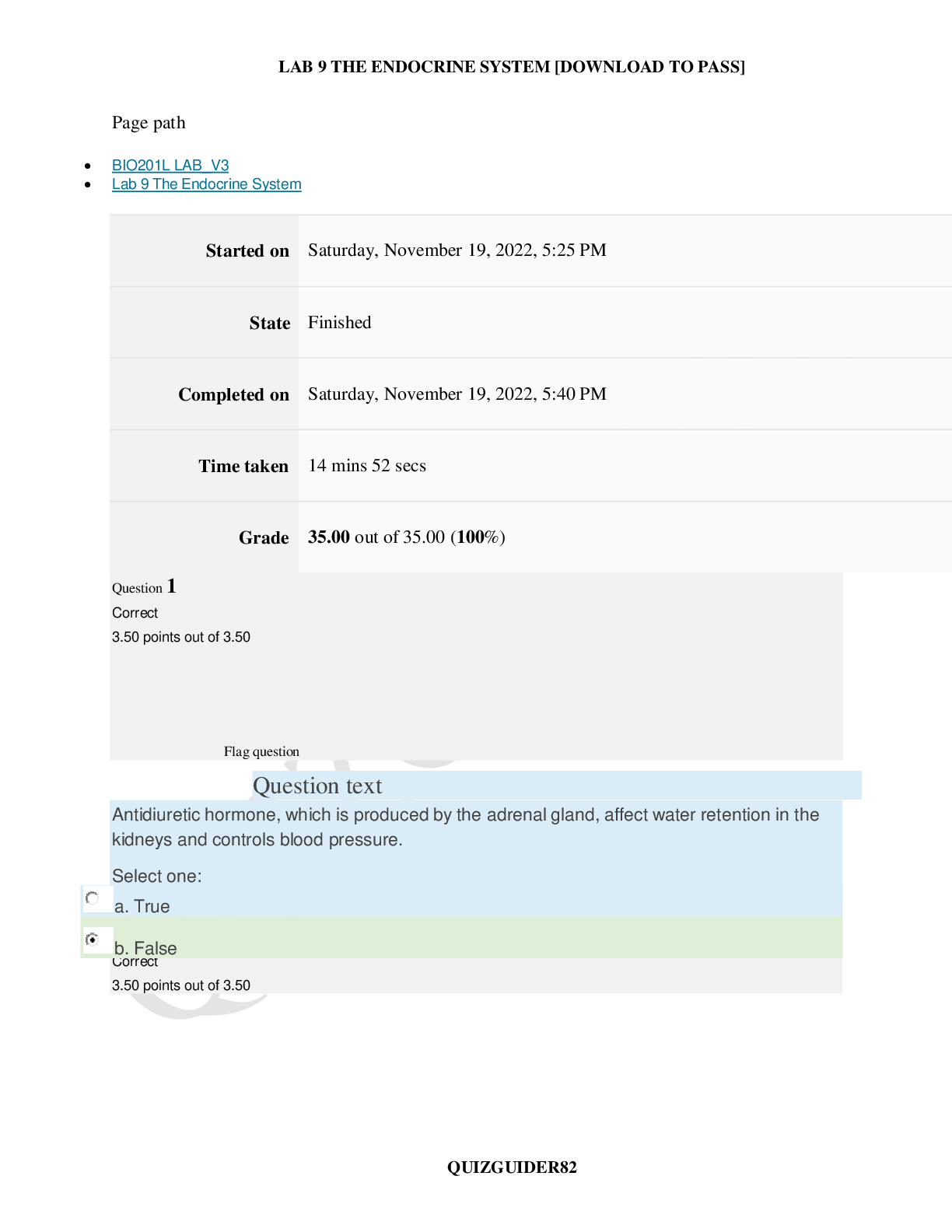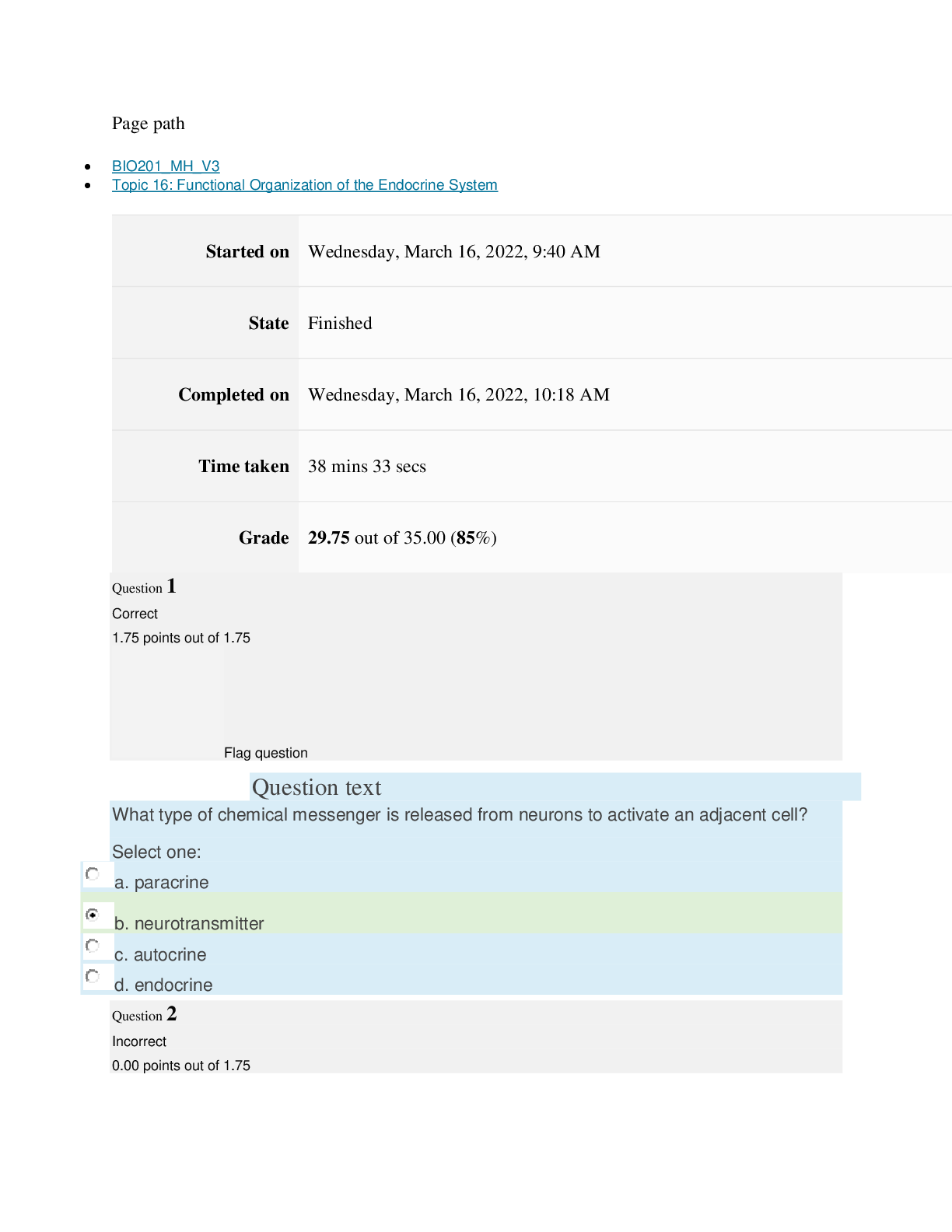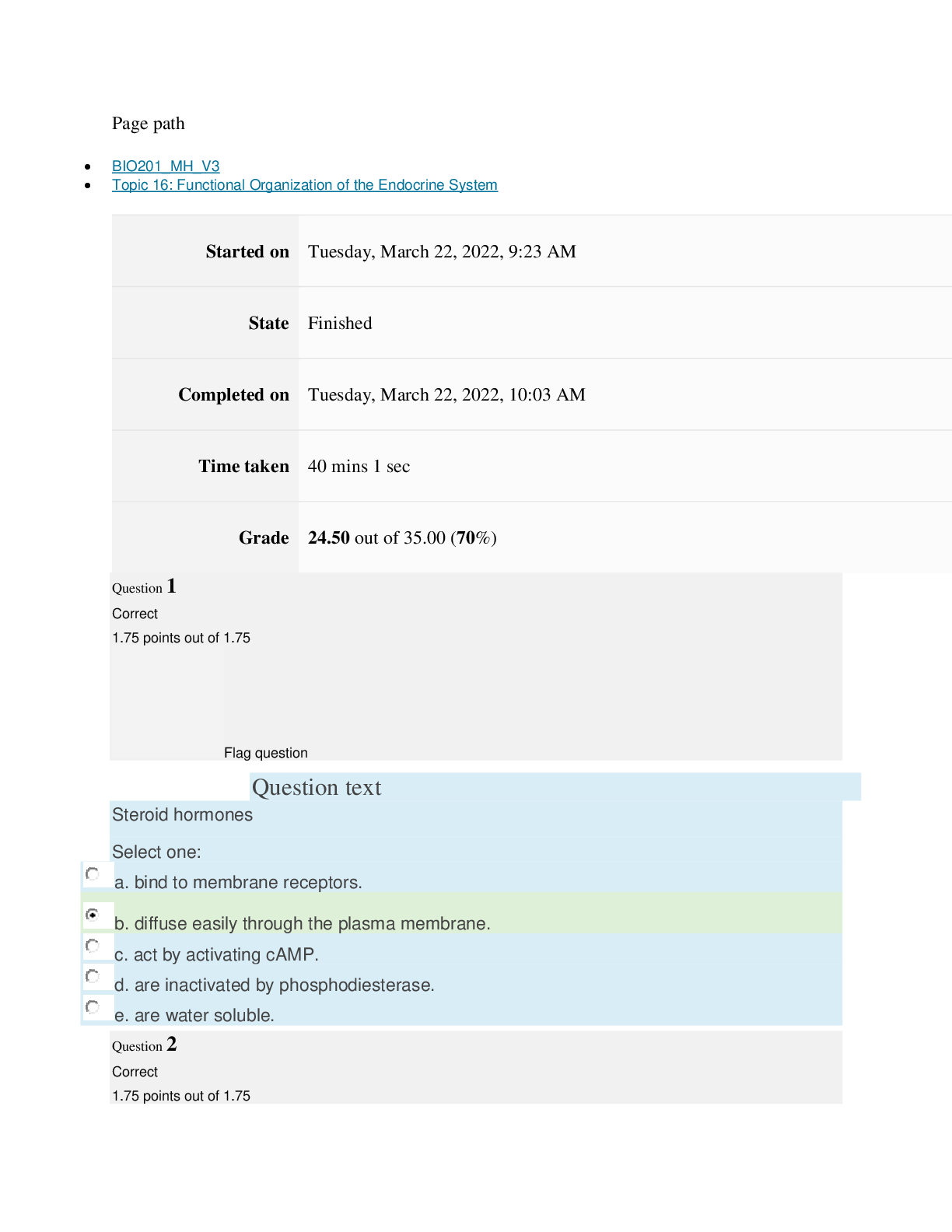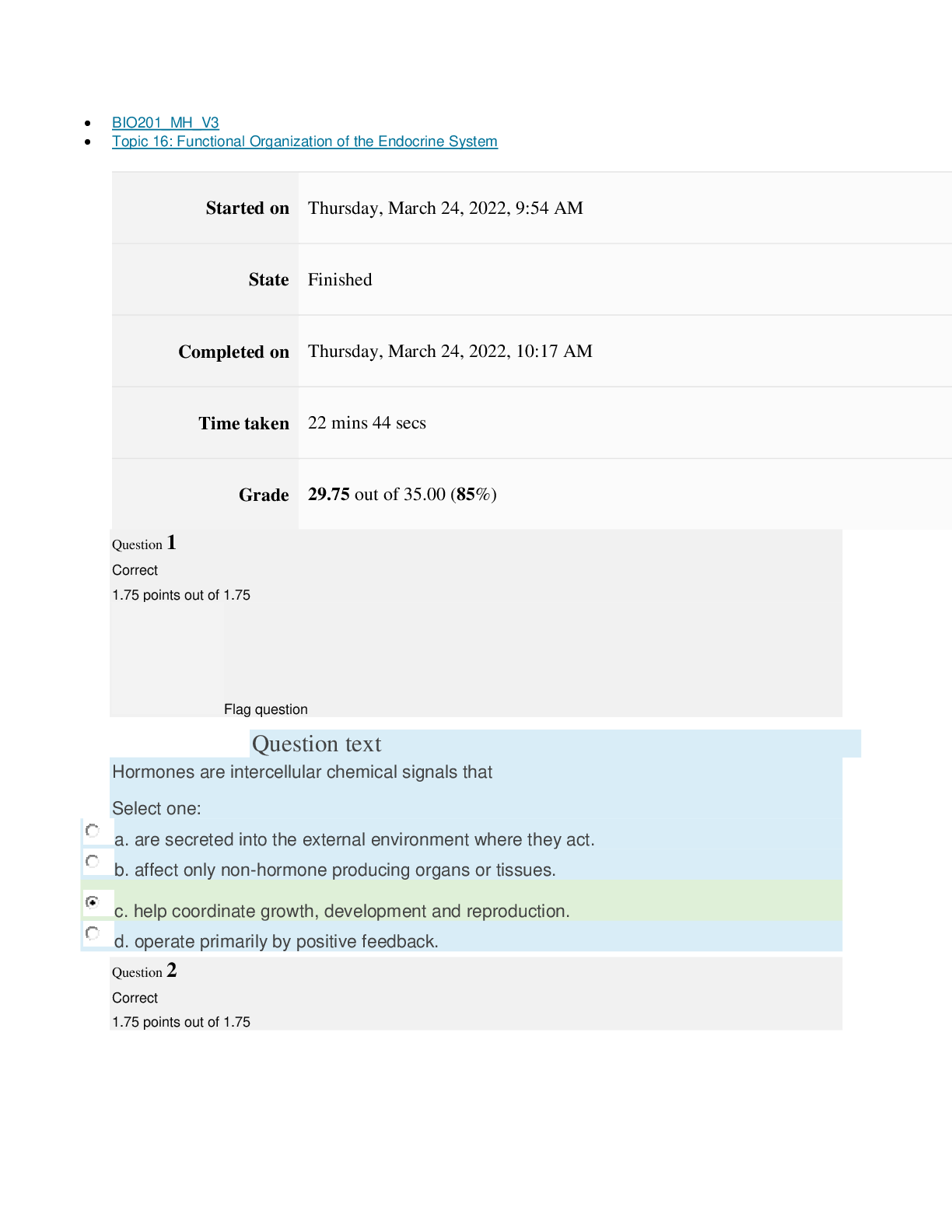*NURSING > QUESTIONS & ANSWERS > ATI Pharmacology Made Easy 4.0: The Endocrine System Answered spring 2022. (All)
ATI Pharmacology Made Easy 4.0: The Endocrine System Answered spring 2022.
Document Content and Description Below
ATI Pharmacology Made Easy 4.0: The Endocrine System Answered 2022 When talking with a patient who is about to begin exenatide (Byetta) therapy to treat type 2 diabetes mellitus, the health care pr... ofessional should include which of the following instructions? (Select all that apply) ..... A) Inject the drug subcutaneously B) Expect the peak effect in 2 hr. C) Use the drug as a supplement to an oral hypoglycemic D) Inject the drug 1 hr after a meal E) Discard used pens 10 days after the first use. A health care professional administers pramlintide (Symlin) at 0800 to a patient who has type 1 diabetes mellitus. At which of the following times should the patient expect the drug to exert its peak action? ..... A) 0820 B) 0900 C) 1000 D) 1100 A patient who is taking propylthiouracil (PTU) contacts the health care professional to report weight gain, drowsiness, and depression. The health care professional should suspect which of the following adverse reactions to the propylthiouracil? ..... A) Thyrotoxicosis B) Hypothyroidism C) Lactic acidosis D) Radiation sickness When talking with a patient who is about to begin repaglinide (Prandin) therapy to treat type 2 diabetes mellitus, the health care professional should include which of the following instructions? .... A) Do not drink more than 1 L of grapefruit juice per day. B) Carry a high-protein snack at all times. C) Drink 16 oz of water after taking the drug. D) Use ginseng to reduce nausea. A health care professional is caring for a patient who is about to begin taking pioglitazone (Actos) to treat type 2 diabetes mellitus. The health care professional should explain to the patient the need to monitor which of the following laboratory tests? (Select all that apply) .... A) Thyroid-stimulating hormone (TSH) B) Alanine aminotransferase (ALT) C) LDL D) CBC E) Creatinine clearance When considering replacement therapy options for a patient who has chronic adrenocortical insufficiency, the primary care provider should chose which of the following drugs? .... A) Somatropin (Genotropin) B) Hydrocortisone (Cortef) C) Glucagon (GlucaGen) D) Desmopressin (DDAVP) A health care professional is caring for a patient who is taking regaglinide (Prandin) 15 to 30 minutes before each meal to treat type 2 diabetes mellitus. The patient asks the health care professional what to do if he skips a meal. Which of the following is the appropriate response? .... A) Double the dose before the next meal. B) Take half the dose. C) Skip the dose. D) Take the usual dose. Which of the following drugs should a health care professional have available for a patient who is experiencing an insulin overdose? .... A) Naloxone B) Diphenhydramine C) Acetylcysteine (Acetadote) D) Glucagon (GlucaGen) A patient who is taking metformin (Glucophage) to treat type 2 diabetes mellitus plans to undergo angiography using iodine-containing contrast dye. The health care professional should recognize that an interaction between metformin and the IV contrast dye can increase the patient's risk for which of the following? .... A) Hypokalemia B) Hyperglycemia C) Acute renal failure D) Acute pancreatitis A health care professional is caring for a patient who is about to begin taking propylthiouracil (PTU) to treat hyperthyroidism. The health care professional should tell the patient to report which of the following adverse effects? (Select all that apply) .... A) Sore throat B) Muscle pain C) Insomnia D) Bradycardia E) Rash – When talking with a patient about taking fludrocortisone to treat adrenocortical insufficiency, the health care professional should tell the patient to do which of the following to reduce the risk of adverse reactions? (Select all that apply) ... A) Weigh yourself daily B) Report weakness or palpitations C) Have your blood pressure checked regularly D) Eat more iron-rich foods E) Avoid drinking grapefruit juice A health care professional is caring for a patient who is about to begin taking radioactive iodine-131 (Iodotype) to treat Grave's disease. Which of the following instructions should the health care professional include when talking with the patient about this drug? ... A) Take the drug once daily for 5 days. B) Expect a bitter, acid-like taste. C) Restrict fluid intake after taking the drug. D) Expect full effects in 2 to 3 months. A patient who is taking glipizide (Glucotrol) to treat type 2 diabetes mellitus contacts the health care professional to report feeling shaky, hungry, and fatigued. The health care professional should tell the patient to do which of the following? ... A) Drink 16 oz of water. B) Perform a fingerstick blood glucose check. C) Take another glipizide tablet. D) Lie down and rest. A primary care provider should prescribe a lower dose of sitagliptin (januvia) for a patient who has type 2 diabetes mellitus and who also has which of the following? ... A) Thyroid Disease B) Bronchitis C) Heart Failure D) Renal Impairment When talking to a patient who is about to begin glipizide (Glucotrol) therapy to treat type 2 diabetes mellitus, the health care professional should include which of the following instructions? ... A) Avoid drinking alcohol. B) Sit or stand for 30 min after taking the drug. C) Urinate every 4 hr. D) Take the drug 2 hr after a meal. A patient who is taking metformin (Glucophage) to treat type 2 diabetes mellitus contacts the health care professional to report muscle pain. The health care professional should suspect which of the following adverse reactions? ... A) Lactic acidosis B) Anticholinergic effects C) Extrapyramidal symptoms D) Hypophosphatemia A health care professional is caring for a patient who is about to begin taking somatropin (Genotropin). The health care professional should explain the need to monitor which of the following laboratory tests? (Select all that apply) ... - Blood amylase - Creatinine clearance - Urine calcium - Blood glucose - CBC - A health care professional is caring for a patient who is about to begin acarbose (Precose) therapy to treat type 2 diabetes mellitus. Which of the following instructions should the health care professional include when talking with the patient about the drug? ... A) Eat more iron-rich foods. B) Avoid drinking grapefruit juice. C) Increase fiber intake. D) Avoid drinking green tea. Rationale: Acarbose, an alpha-glucosidase inhibitor, can cause iron-deficiency anemia. A healthcare professional should tell the patient to increase his intake of iron-rich foods, such as red meat, spinach, and Grains, and monitor the patients CBC. A health care professional is caring for a patient who is taking pioglitazone (Actos) to treat type 2 diabetes mellitus. The health care professional should monitor for which of the following findings that indicates an adverse effect? ... A) Joint pain B) Constipation C) Weight gain D) Dilated pupils A health care professional is caring for a patient who is about to begin insulin glargine (Lantus) therapy. The health care professional should recognize the need for additional precautions because the patient also takes which of the following types of drugs? ... A) Oral contraceptives B) Calcium supplements C) Beta blockers D) Iron supplements To determine the effectiveness of desmopressin (DDAVP), a health care professional should monitor a patient's __________. ... A) peripheral pulses B) urine output C) skin integrity D) blood glucose A health care professional is caring for a patient who is about to begin pramlintide (Symlin) therapy to treat type 1 diabetes mellitus. Which of the following instructions should the health care professional include when talking with the patient about using the drug? ..... A) Mix pramlintide with insulin. B) Inject pramlintide before meals. C) Take pramlintide at bedtime. D) Inject pramlintide into the upper arm. A health care professional is talking to a patient about self-injecting Regular insulin (Humulin). The health care professional should tell the patient to rotate injection sites to prevent which of the following? ..... A) Rapid absorption B) Intradermal injection C) Injection pain D) Lipohypertrophy A health care professional is caring for a patient who is about to begin levothyroxine (Synthroid) therapy to treat hypothyroidism. Which of the following instructions should the health care professional include when talking with the patient about taking the drug? .... A) Take levothyroxine with food to inccrease absorption. B) Take levothyroxine with an antacid to reduce GI effects. C) Expect life-long therapy with the drug. D) Carry a carbohydrate snack at all times. A health care professional should question the use of levothyroxine (Synthroid) for a patient who has __________. ..... A) bacterial skin infections B) diabetes insipidus C) immunosuppression D) a myocardial infarction [Show More]
Last updated: 1 year ago
Preview 1 out of 6 pages

Reviews( 0 )
Document information
Connected school, study & course
About the document
Uploaded On
Apr 04, 2022
Number of pages
6
Written in
Additional information
This document has been written for:
Uploaded
Apr 04, 2022
Downloads
0
Views
137

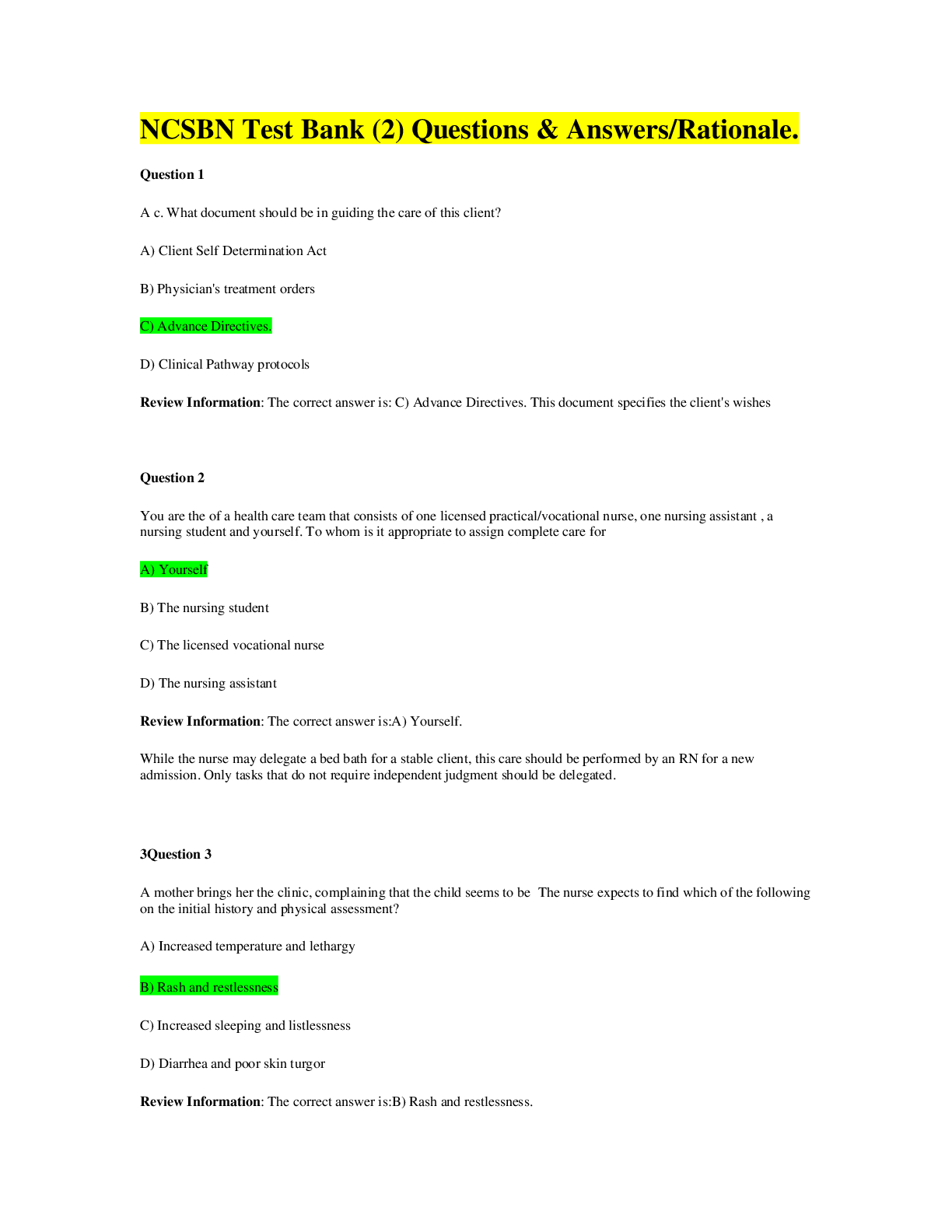
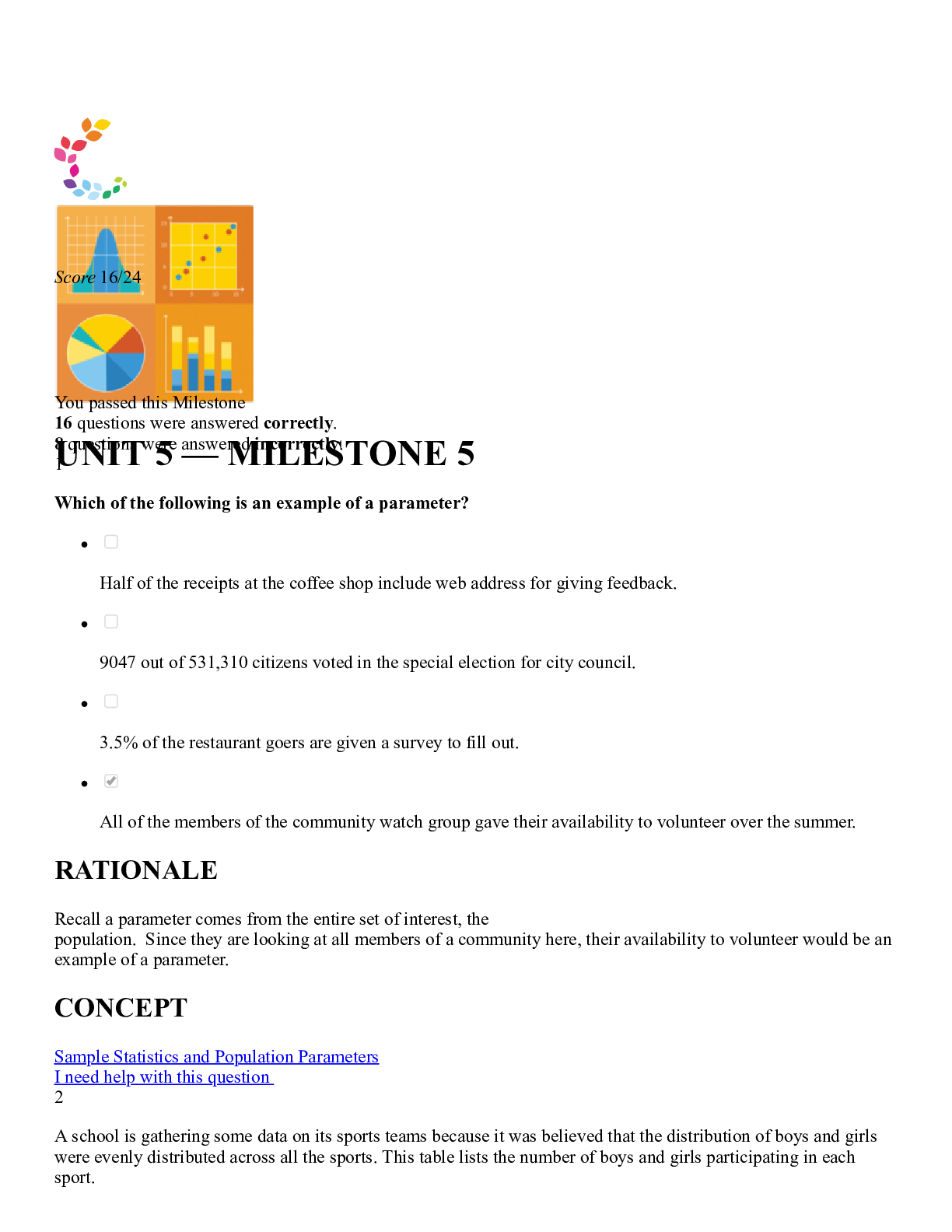
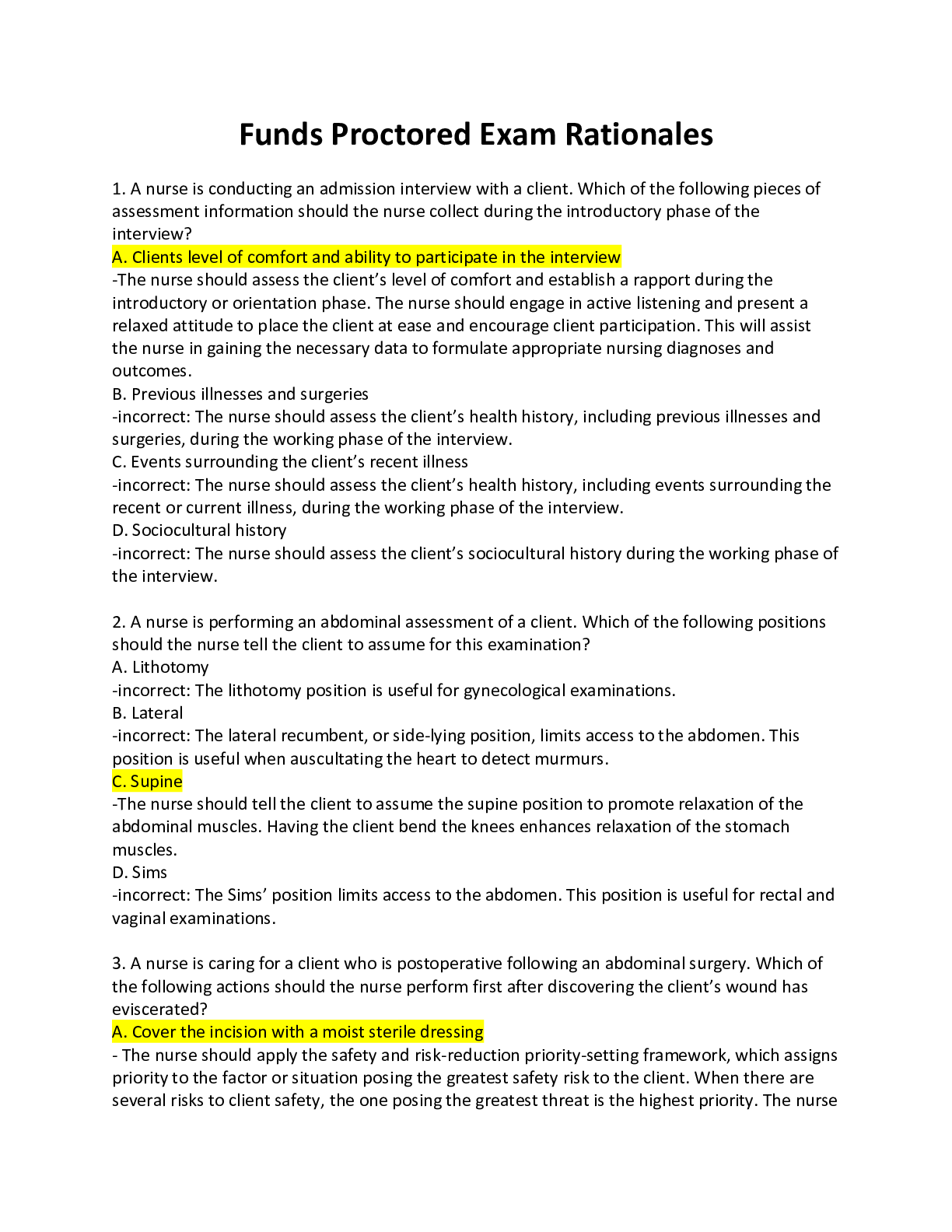
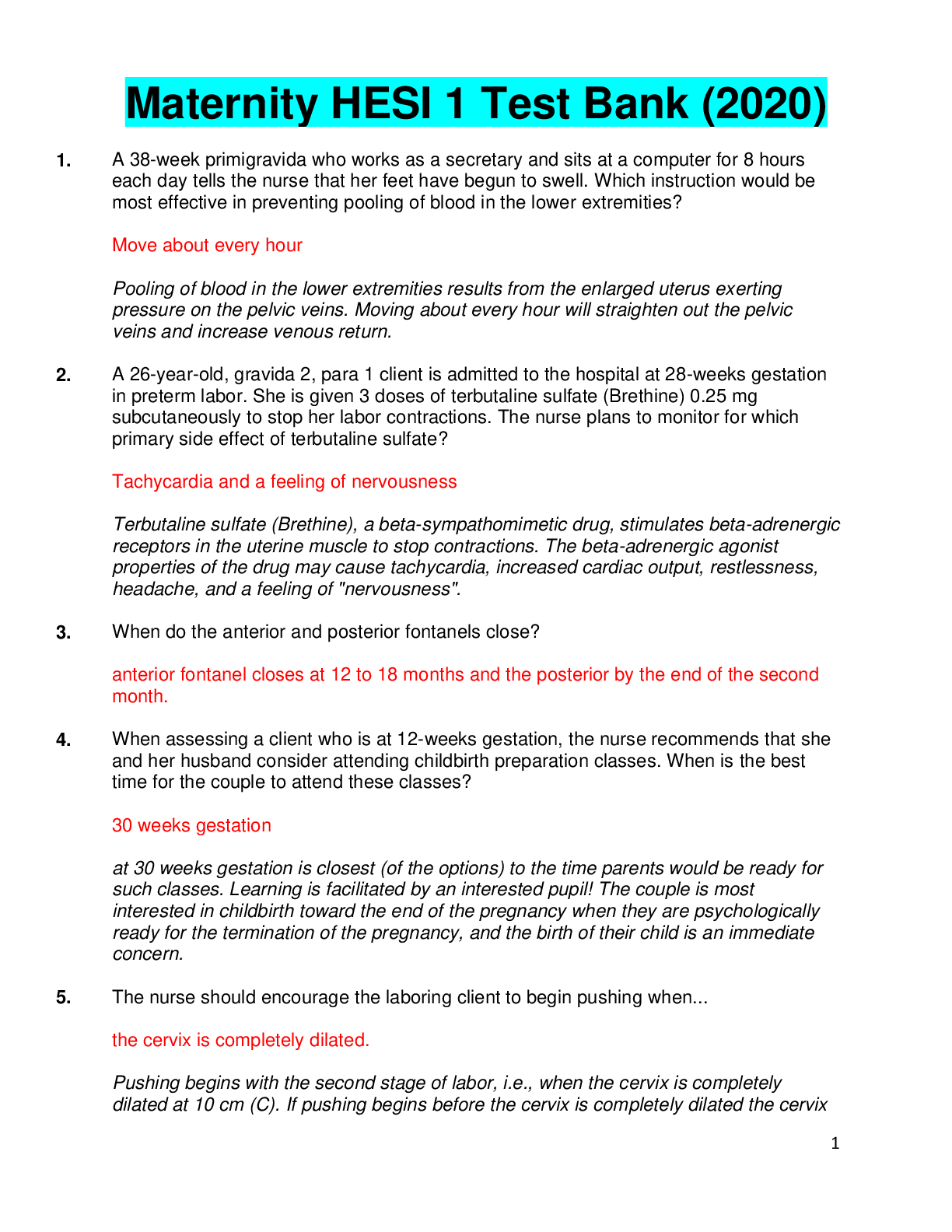
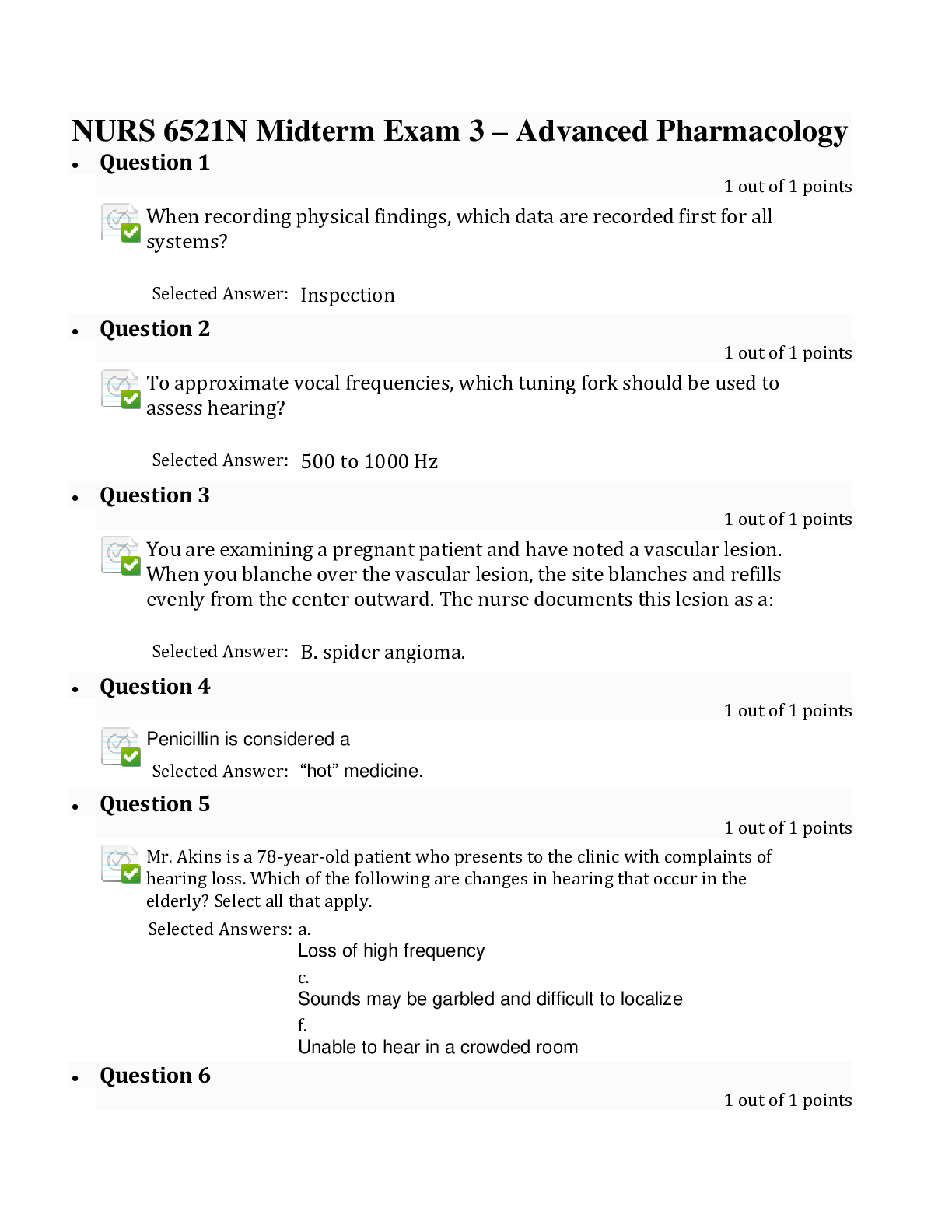
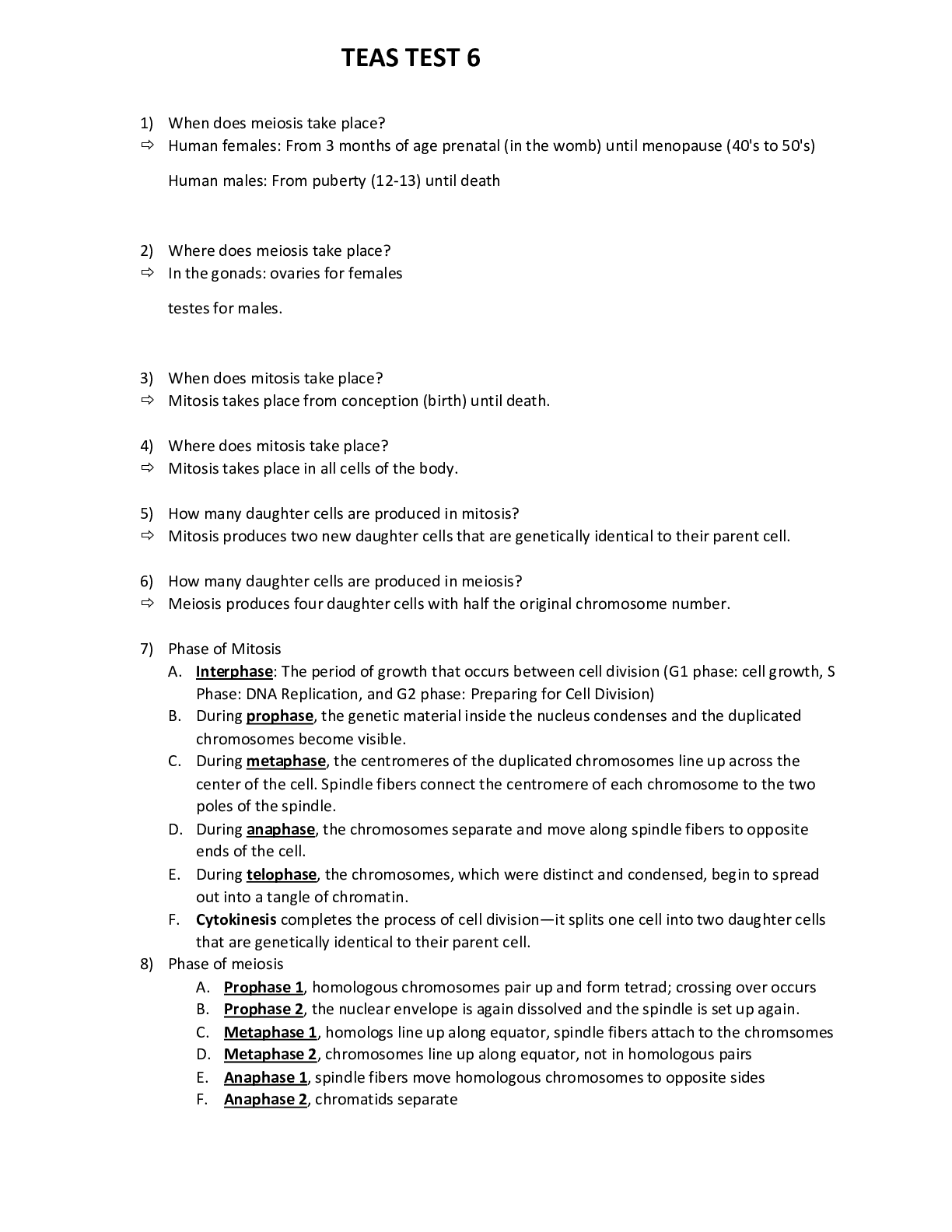
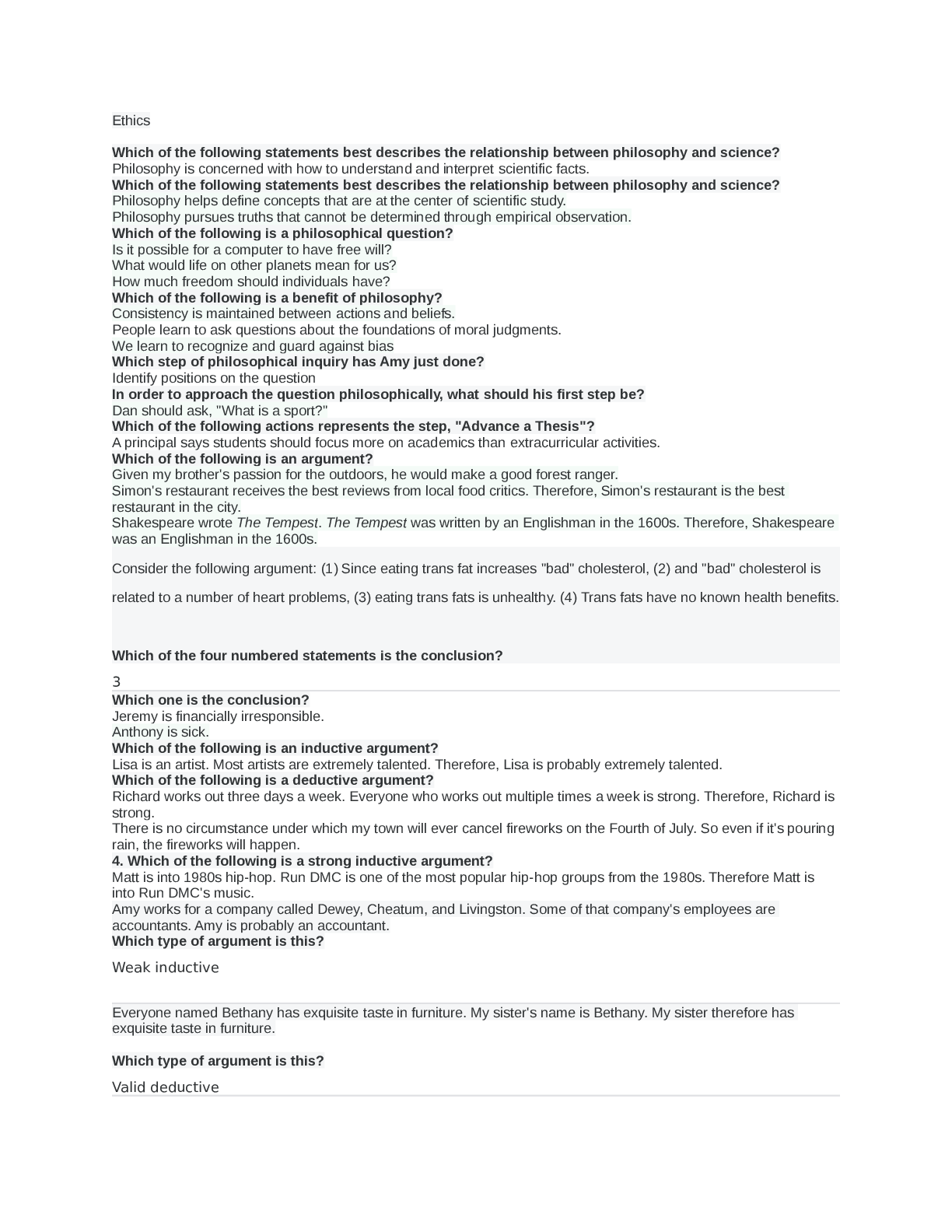

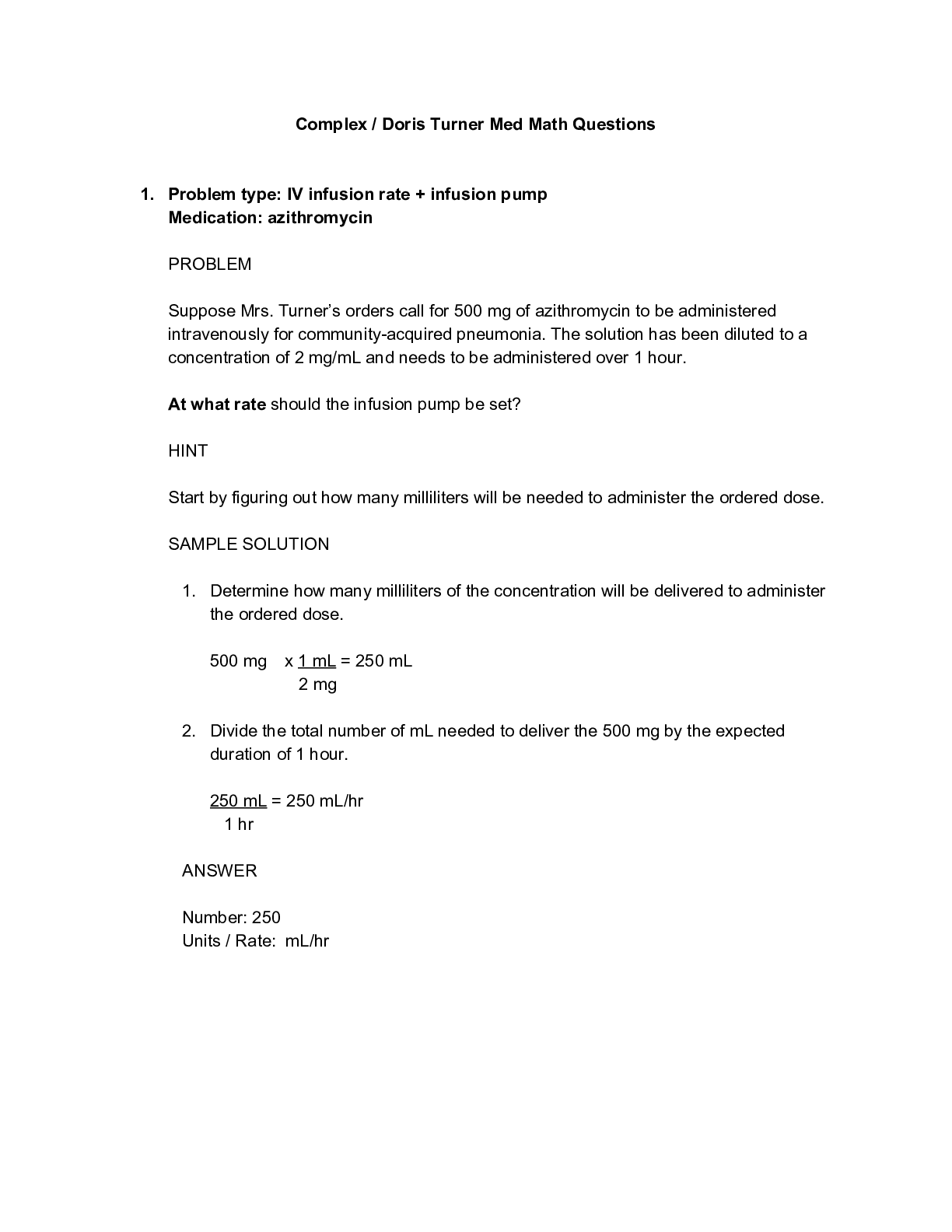
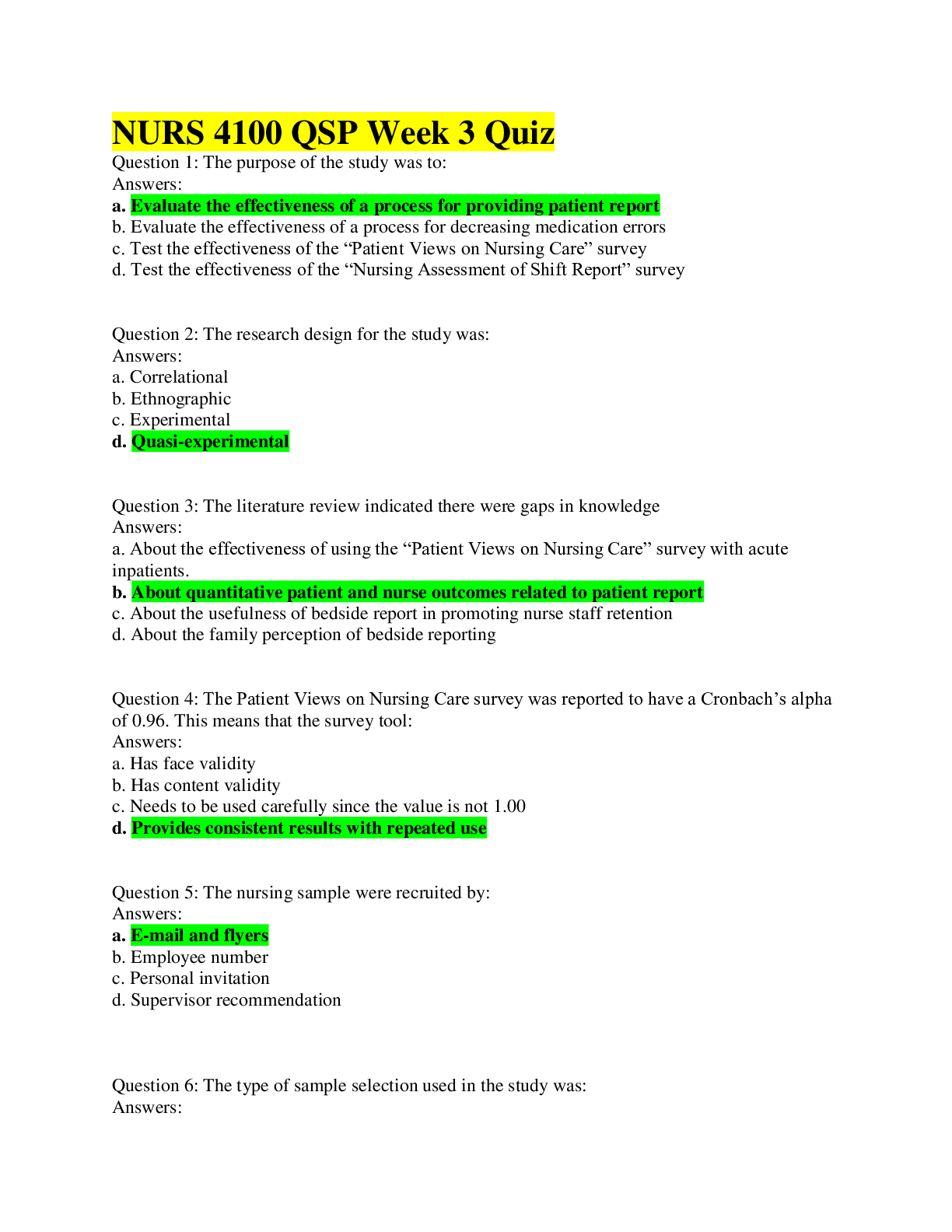
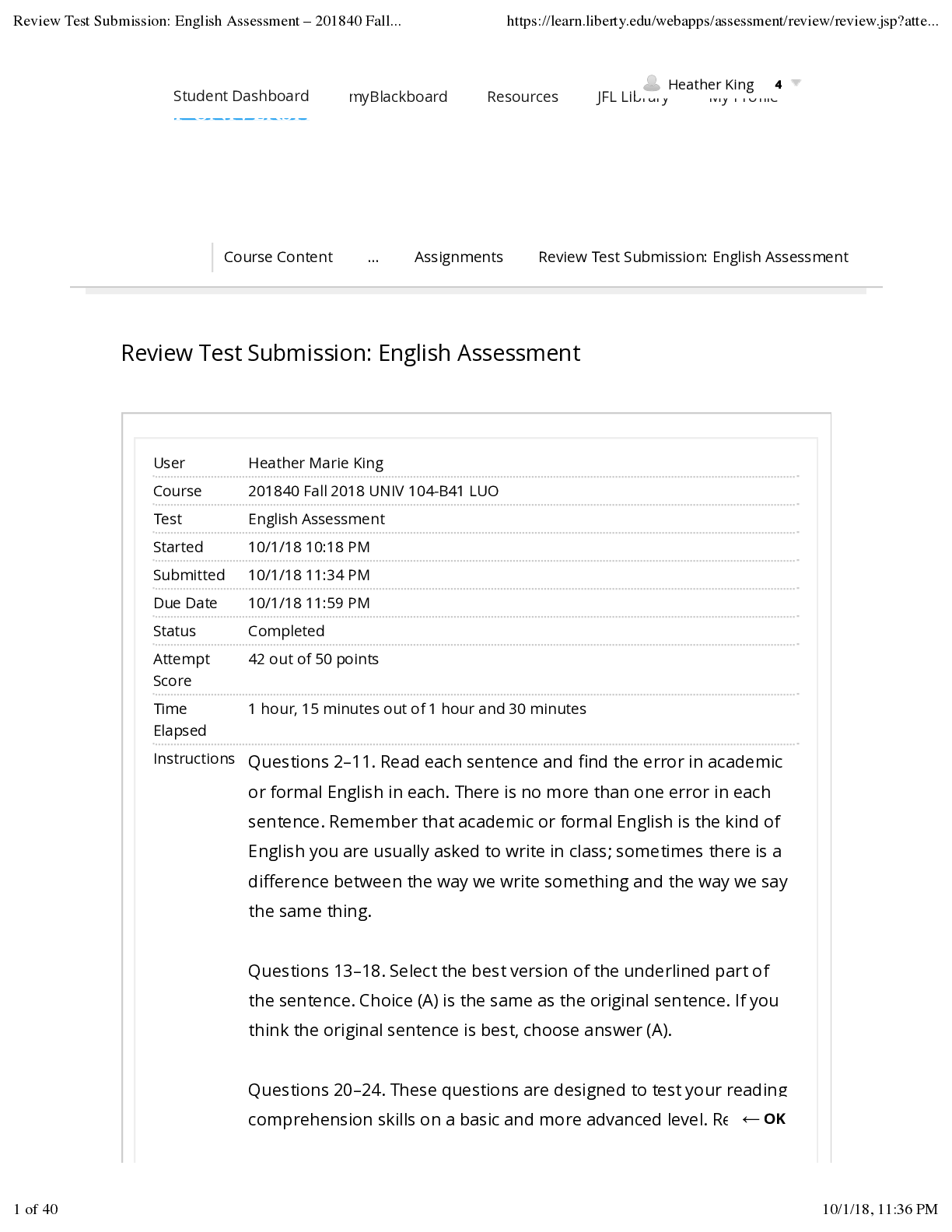

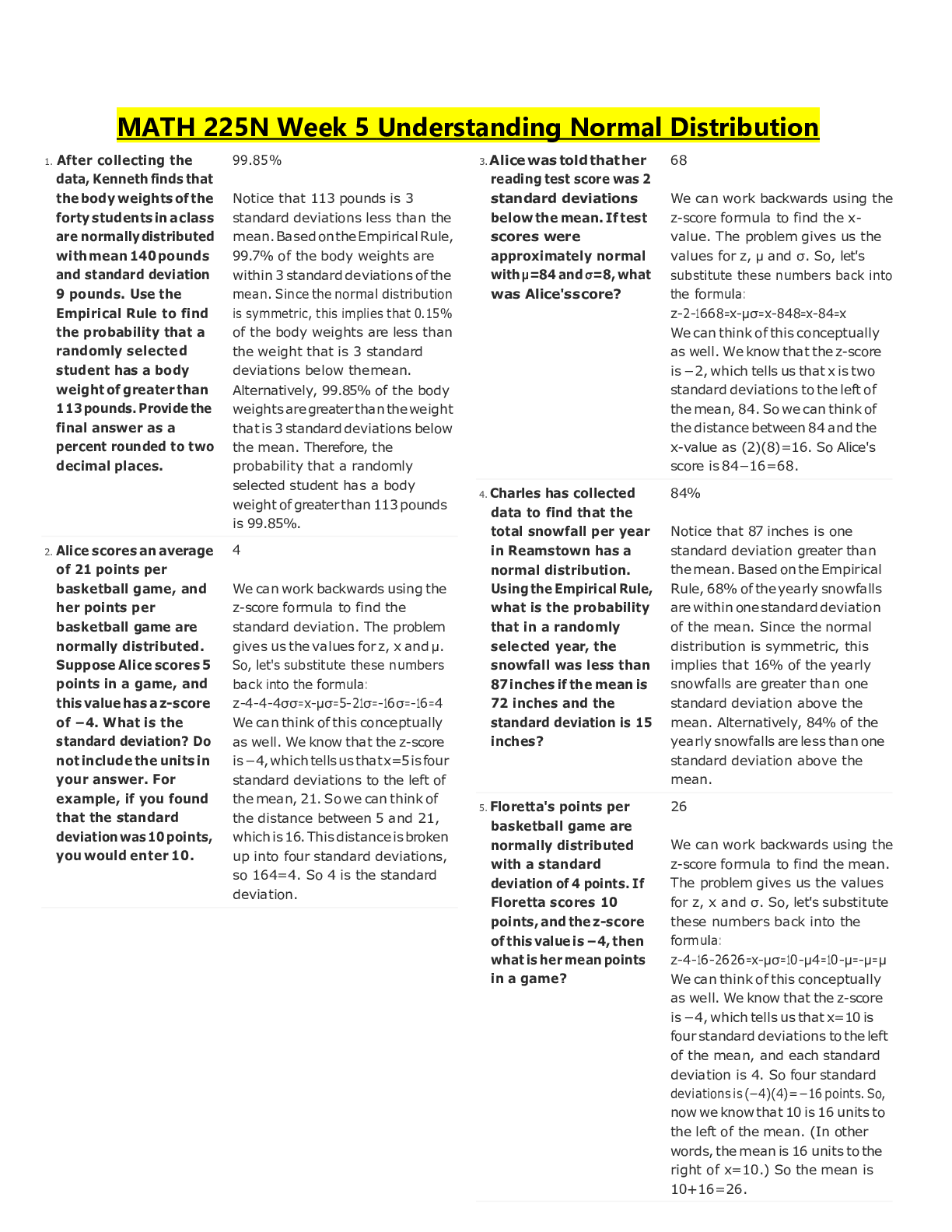
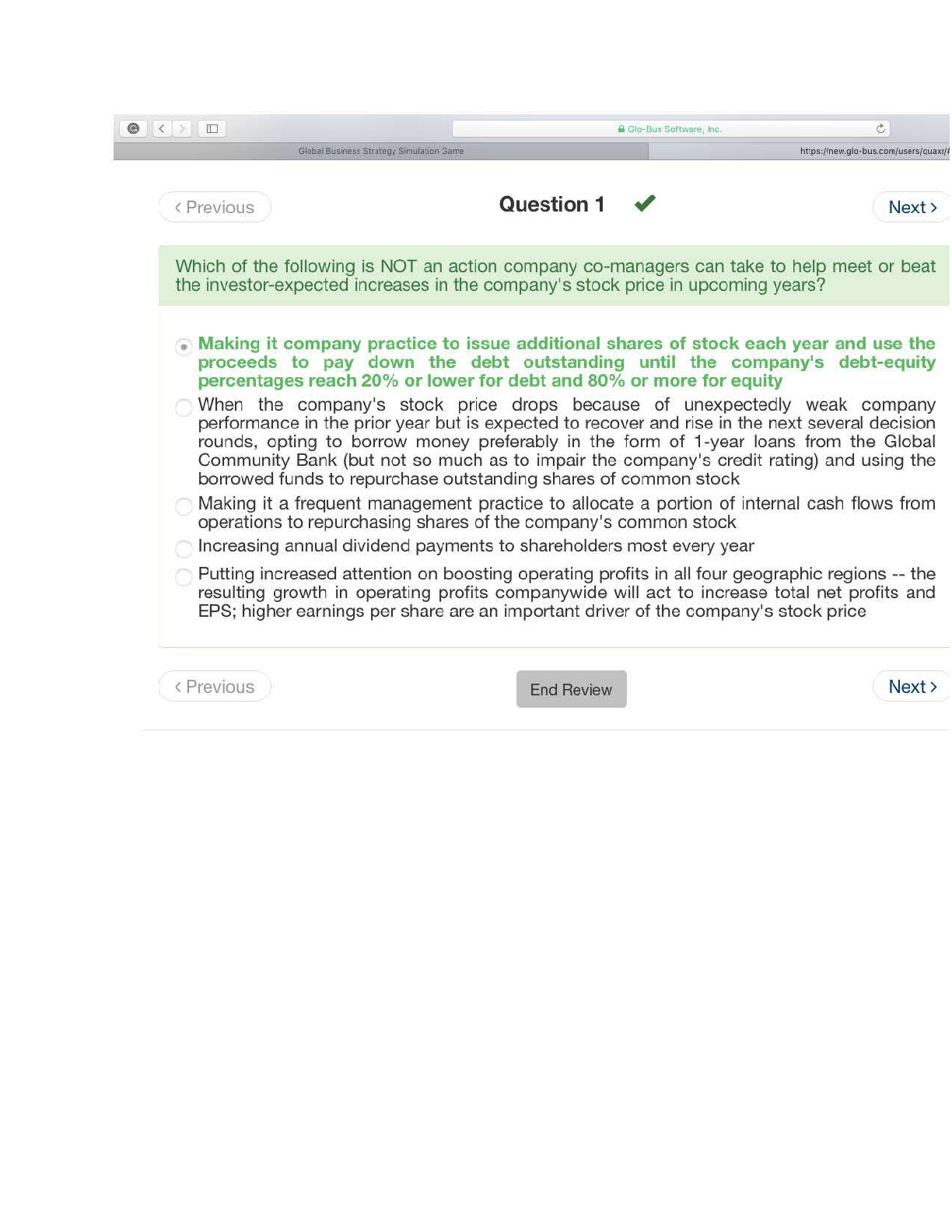
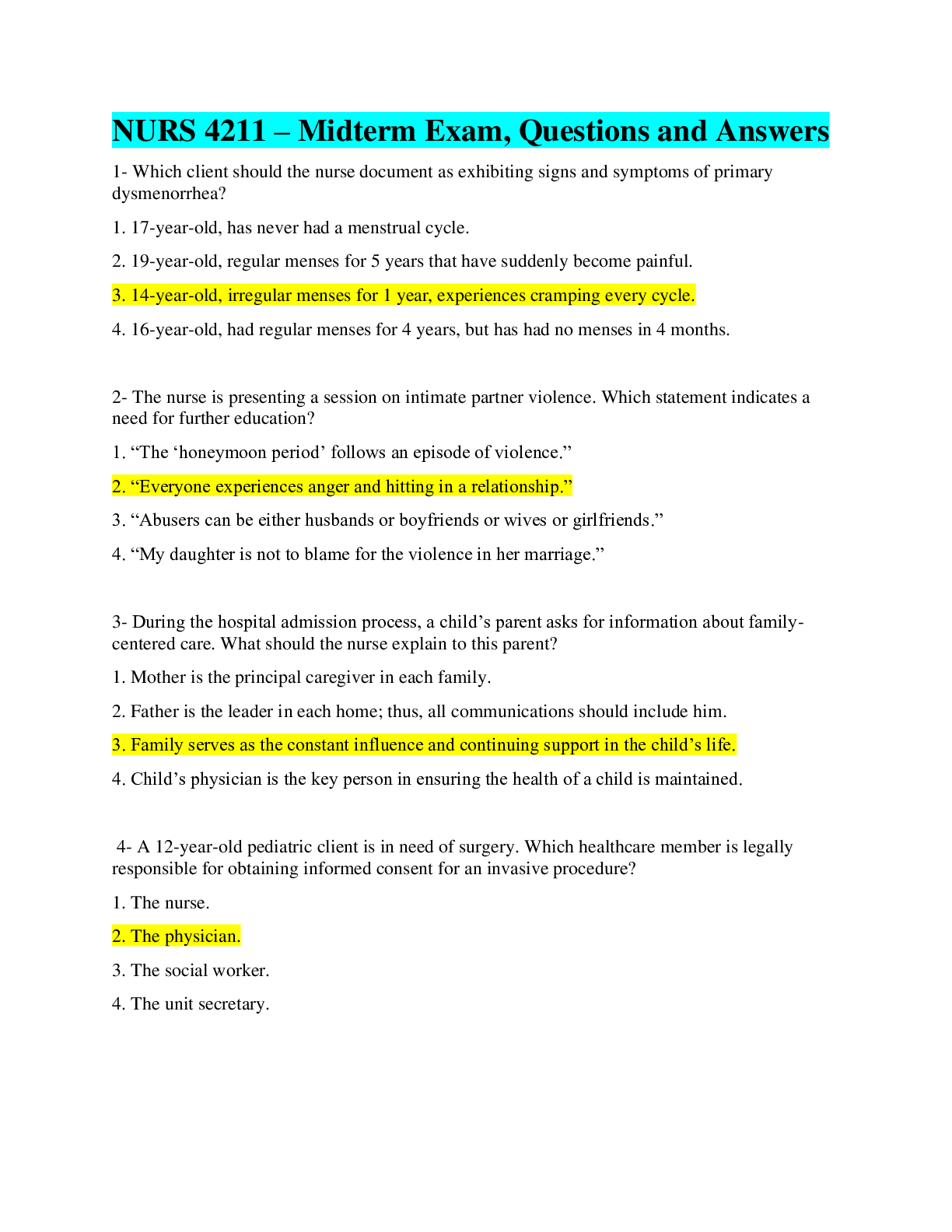

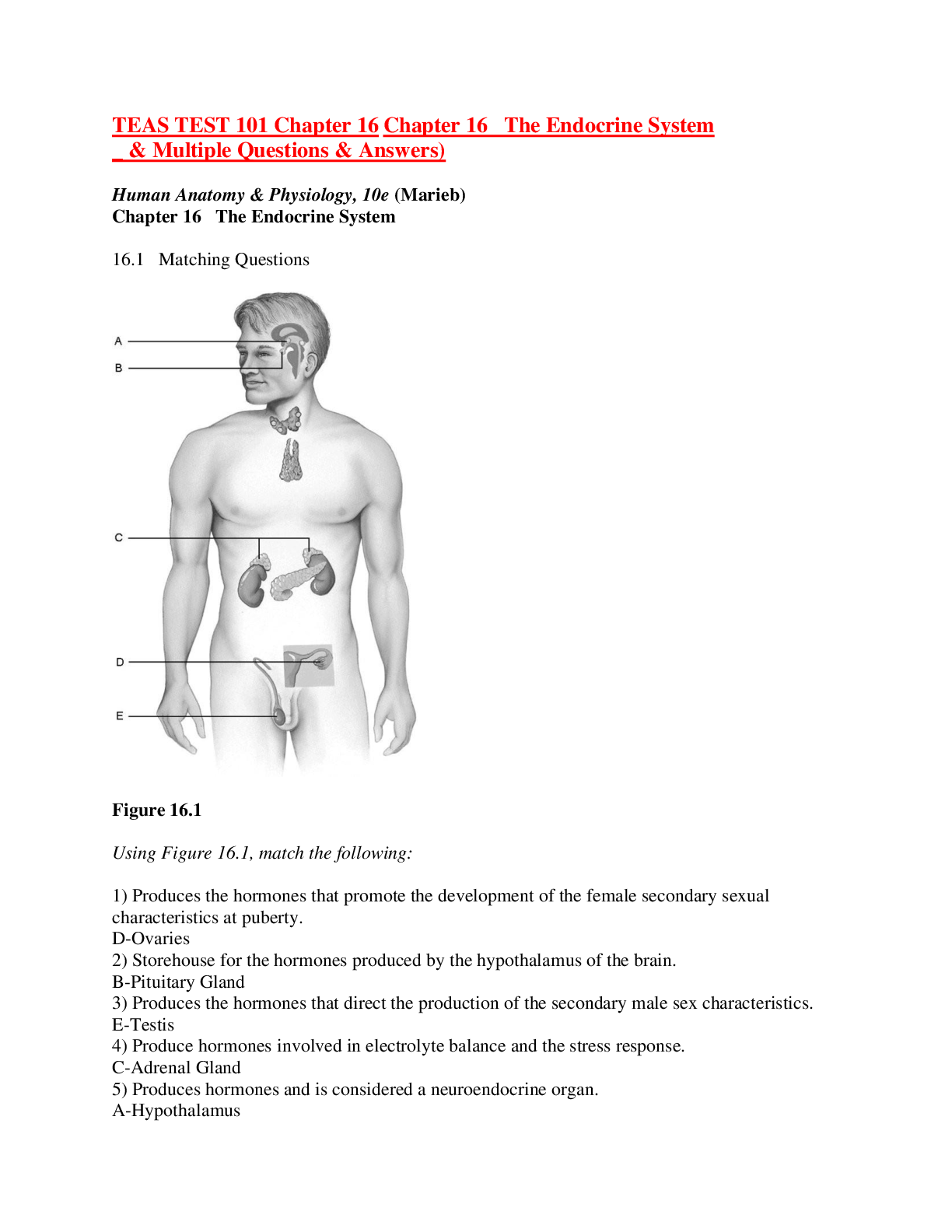
.png)
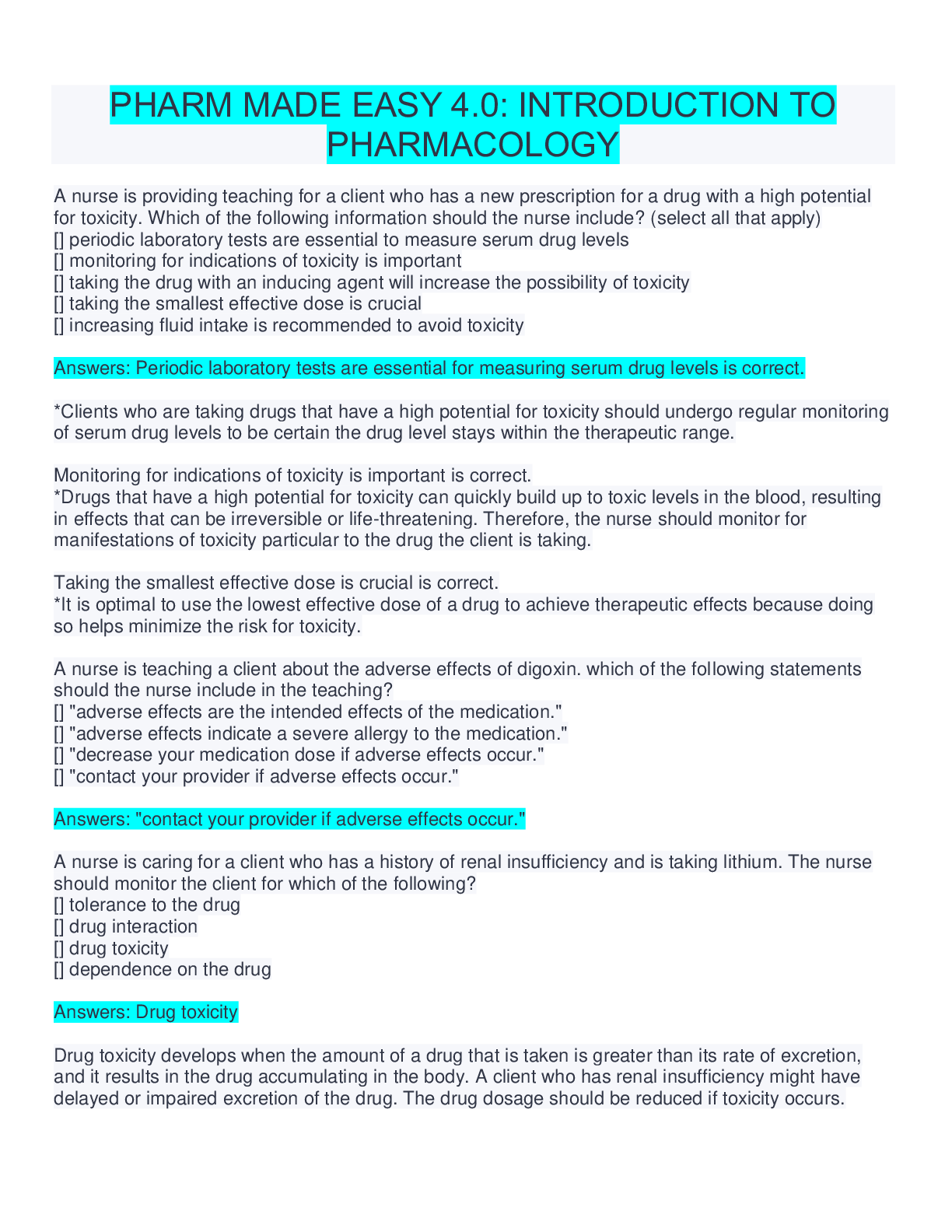
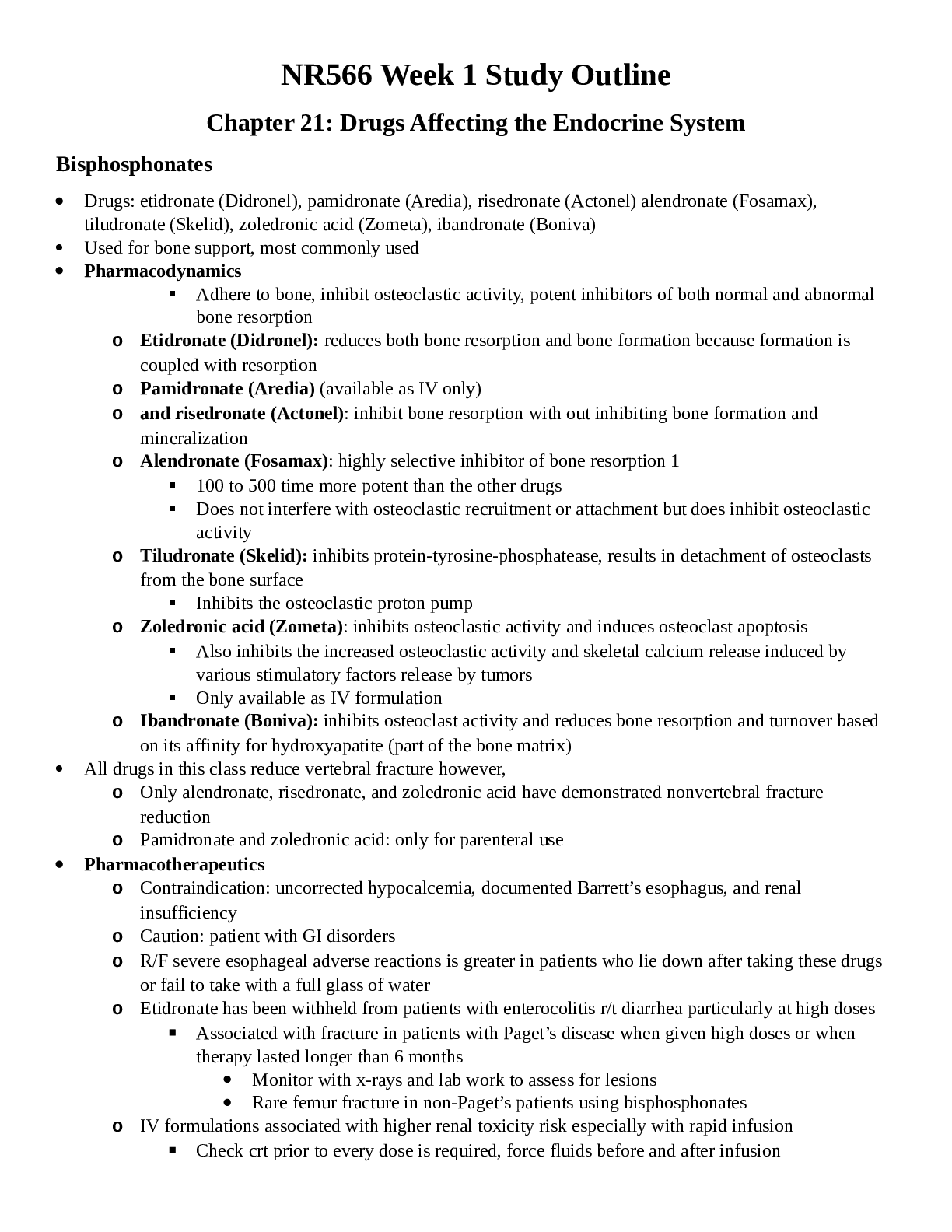
 (2).png)
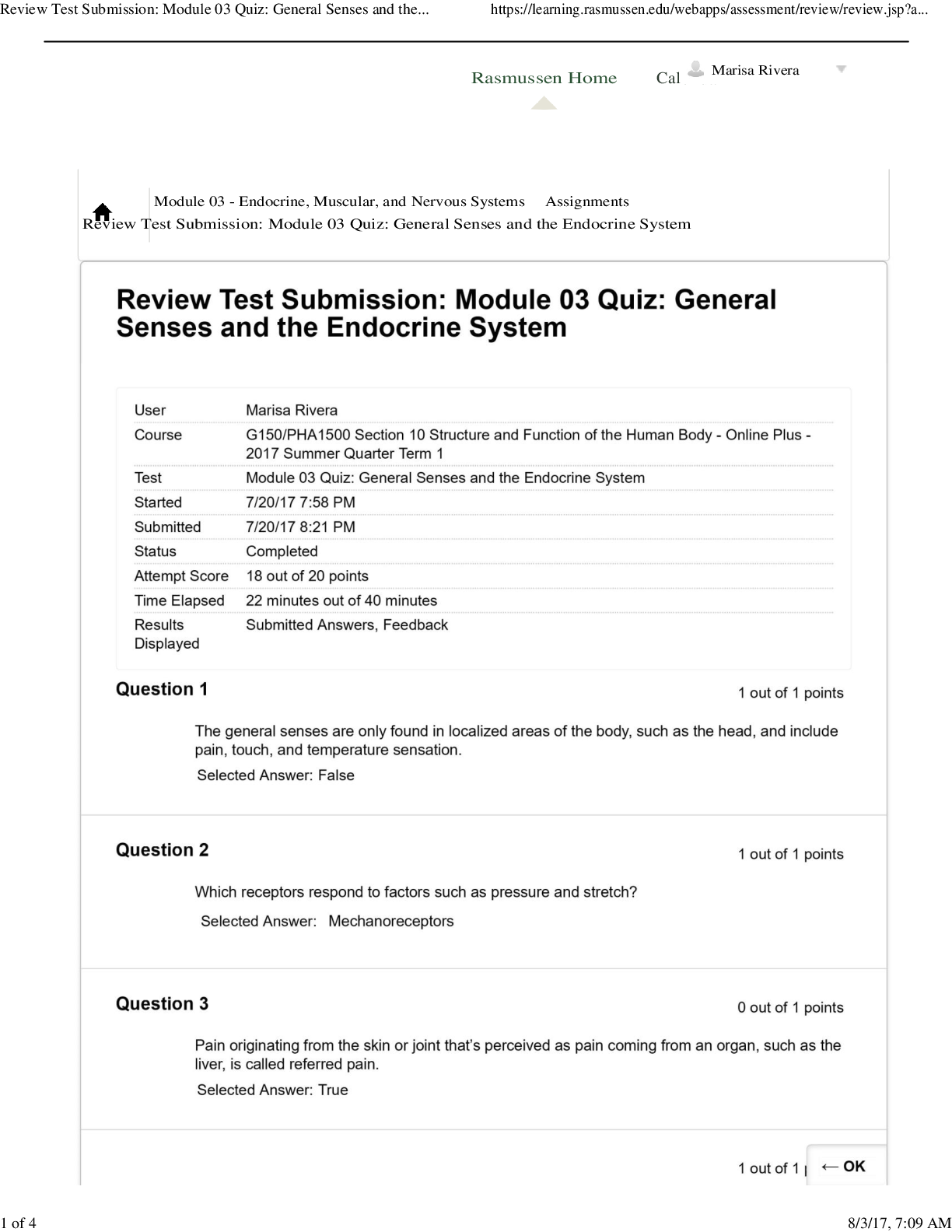
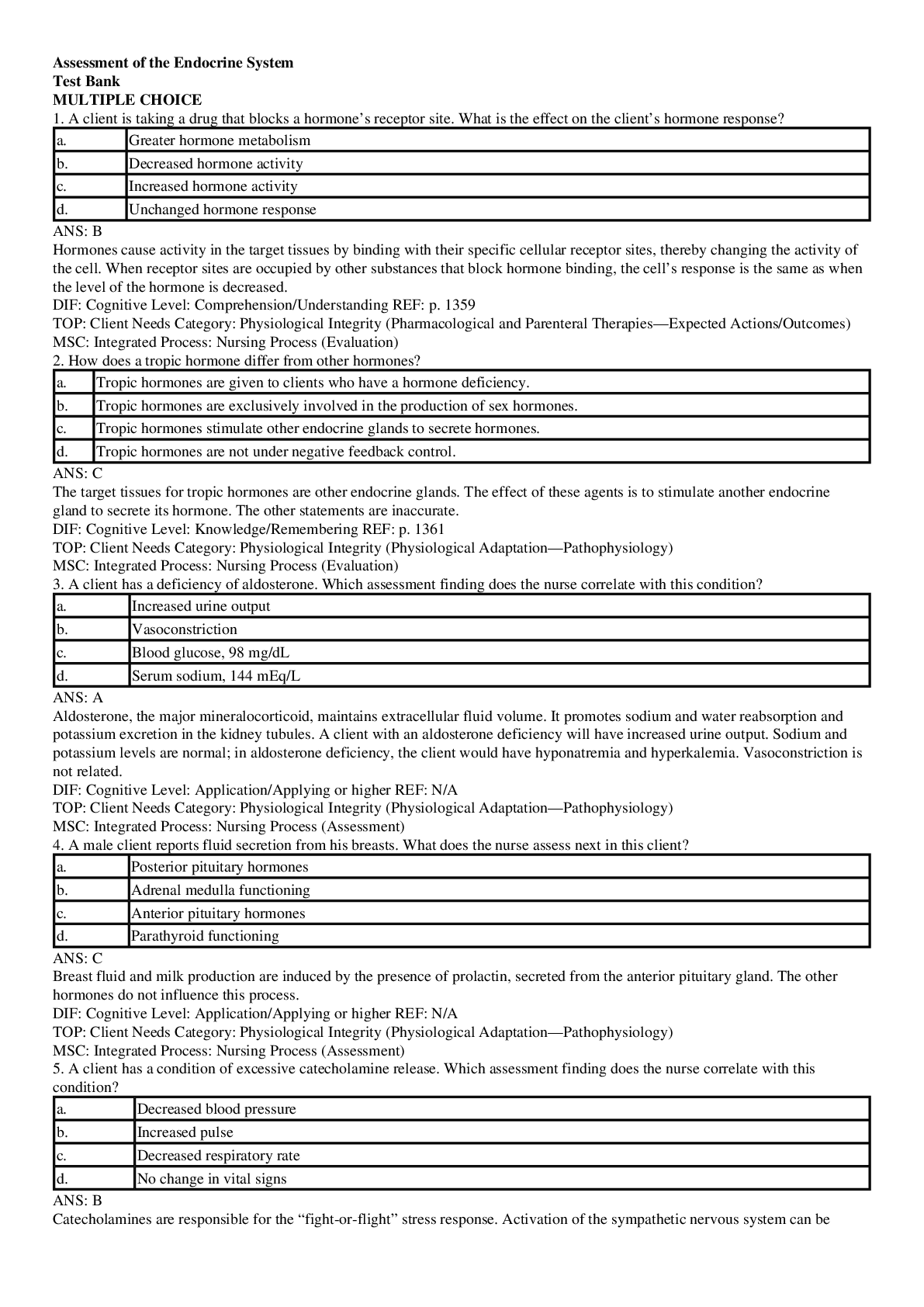

.png)
.png)
.png)
.png)
.png)
